Updates from the Mukurtu Midwest Hub
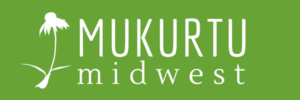
For the last three years, WiLS and the University of Wisconsin-Madison iSchool have partnered with Washington State University on an Institute of Museum and Library Services (IMLS) funded initiative to establish a regional Mukurtu training and outreach hub. The grant was slated to end in September 2019, however, thanks to IMLS the project has been extended to December 2020. As we move into the next phase of this grant our goals are to continue to: provide community feedback to WSU so that they can produce a Mukurtu 3.0 release with updated features and functions; work towards creating a sustainable Midwest Hub that continues to provide regional support in Indigenous digital archiving; and work with communities and institutions on expanding the use of Mukurtu, while educating on the larger social and cultural aspects Mukurtu presents.
Changes need to occur so Indigenous voices are centered in culturally relevant and ethically-minded ways. This requires improved dialogue between traditional collecting institutions and Indigenous communities to build long-term, respectful, and meaningful relationships.
Mukurtu (pronounced Mook-oo-too) is a free, open source content management system (CMS) developed by the Center for Digital Curation and Scholarship at Washington State University. The CMS is designed to support the unique needs of Indigenous libraries, archives, and museums as they seek to preserve and share their digital heritage. It aims to empower communities to manage, share, and exchange their digital heritage in culturally relevant and ethically-minded ways.
The Midwest Hub is dedicated to a community-driven approach of preserving and sharing Indigenous heritage while working with library, archive, and museum communities in the Western Great Lakes region. Our goals are to continue to build the CMS through community involvement, grow the Mukurtu user base, highlight the biases and gaps that currently exist within most content management systems, and to introduce new concepts regarding open access and information freedom.
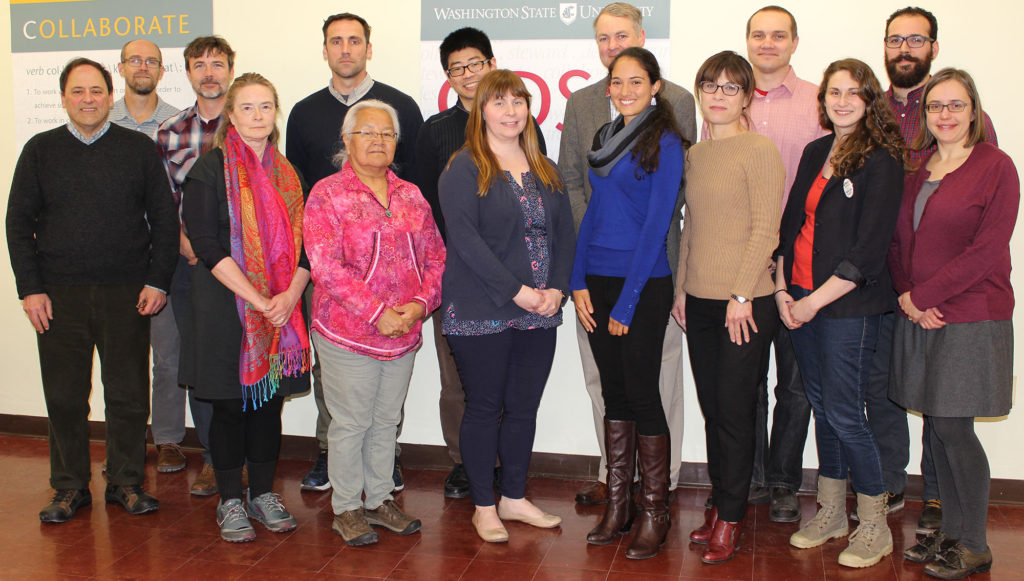 In the first year of the grant, we focused on our training of Mukurtu, learning about community engagement strategies, and building the communication network with other Hubs involved in the grant. Emily Pfotenhauer and I made a trip out to Washington State University in March of 2017 for our first group meeting and met the other Hub leaders from the University of Hawaii’s Department of Linguistics, the Alaska Native Language Archives, the University of Oregon Libraries, and Yale University’s Beinecke Rare Book and Manuscript Library and Yale Indian Papers Project. After our return, we continued our training virtually, began to engage with communities interested in learning more about Mukurtu, and worked on our community-driven user stories for CMS development. We talked to people all over the Midwest region, including the Ho-Chunk Nation, Lac Du Flambeau Band of Lake Superior Chippewa Indians, Little Traverse Bay Bands of Odawa Indians, as well as the Wisconsin Historical Society and the Logan Museum of Anthropology.
In the first year of the grant, we focused on our training of Mukurtu, learning about community engagement strategies, and building the communication network with other Hubs involved in the grant. Emily Pfotenhauer and I made a trip out to Washington State University in March of 2017 for our first group meeting and met the other Hub leaders from the University of Hawaii’s Department of Linguistics, the Alaska Native Language Archives, the University of Oregon Libraries, and Yale University’s Beinecke Rare Book and Manuscript Library and Yale Indian Papers Project. After our return, we continued our training virtually, began to engage with communities interested in learning more about Mukurtu, and worked on our community-driven user stories for CMS development. We talked to people all over the Midwest region, including the Ho-Chunk Nation, Lac Du Flambeau Band of Lake Superior Chippewa Indians, Little Traverse Bay Bands of Odawa Indians, as well as the Wisconsin Historical Society and the Logan Museum of Anthropology.
During this first year, I listened a lot and learned about the changes that needed to occur in the practices and processes that are ingrained within the library, archive, and museum fields. Current structures are rooted in colonialism. Changes need to occur so Indigenous voices are centered in culturally relevant and ethically-minded ways. This requires improved dialogue between traditional collecting institutions and Indigenous communities to build long-term, respectful, and meaningful relationships.
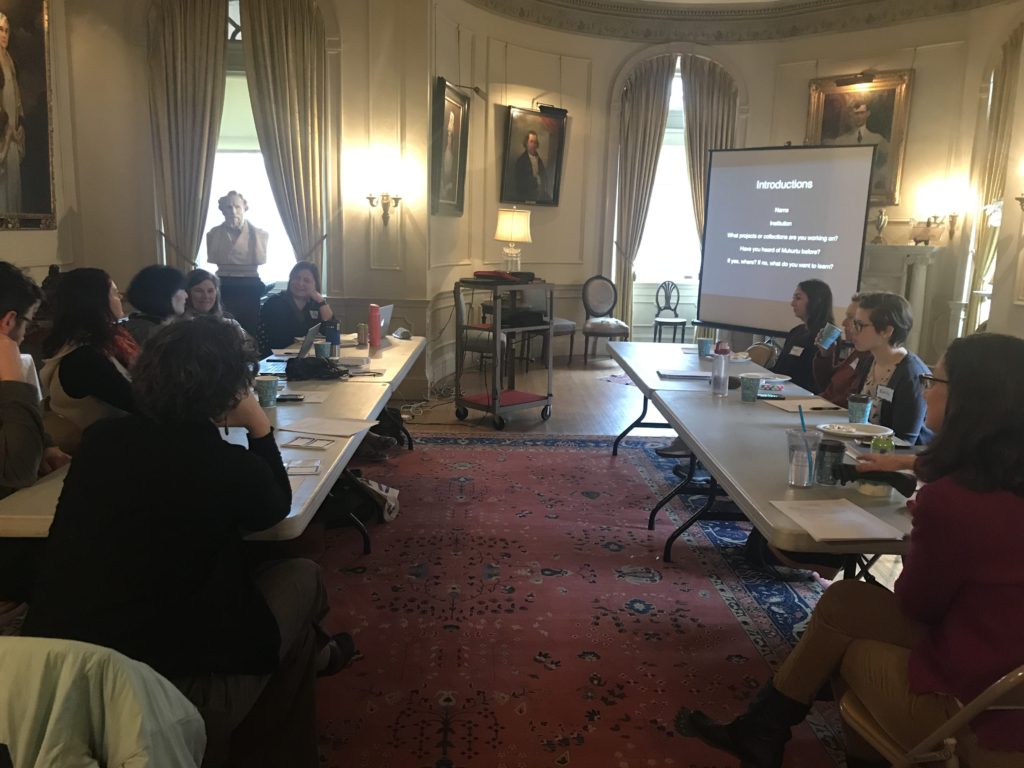 As we moved into the second year of the grant we began conducting Mukurtu training sessions. These sessions allowed participants to have a hands-on experience with Mukurtu, but we also talked about how the design and structure of Mukurtu were based on appropriate circulation, display, and sharing of cultural materials and knowledge. The first session took place at MERIT Library on the University of Wisconsin-Madison campus and included staff from the Ho-Chunk Language Division, Wisconsin Historical Society, University of Wisconsin Libraries, Logan Anthropology Museum, and the Center for the Study of Upper Midwestern Cultures. The second session was hosted by the Minnesota Historical Society and had participants from the University of Minnesota, the Lower Sioux Indian Community, Prairie Island Indian Community, and staff from the Historical Society. Our last session took place at the Evanston History Center in the Chicago area and was attended by staff from the Evanston History Center, Illinois Holocaust Museum, Mitchell Museum of the American Indian, Northwestern University’s Center for Native American and Indigenous Research, Northwestern University’s Libraries, and Northwestern University’s Anthropology Department. We also began to receive community feedback on Mukurtu and started helping communities develop their Mukurtu projects.
As we moved into the second year of the grant we began conducting Mukurtu training sessions. These sessions allowed participants to have a hands-on experience with Mukurtu, but we also talked about how the design and structure of Mukurtu were based on appropriate circulation, display, and sharing of cultural materials and knowledge. The first session took place at MERIT Library on the University of Wisconsin-Madison campus and included staff from the Ho-Chunk Language Division, Wisconsin Historical Society, University of Wisconsin Libraries, Logan Anthropology Museum, and the Center for the Study of Upper Midwestern Cultures. The second session was hosted by the Minnesota Historical Society and had participants from the University of Minnesota, the Lower Sioux Indian Community, Prairie Island Indian Community, and staff from the Historical Society. Our last session took place at the Evanston History Center in the Chicago area and was attended by staff from the Evanston History Center, Illinois Holocaust Museum, Mitchell Museum of the American Indian, Northwestern University’s Center for Native American and Indigenous Research, Northwestern University’s Libraries, and Northwestern University’s Anthropology Department. We also began to receive community feedback on Mukurtu and started helping communities develop their Mukurtu projects.
We are determined to approach all the Mukurtu projects within a ‘slow archives’ framework. In the article “Toward Slow Archives,” Kimberly Christen and Jane Anderson say “slowing down is about focusing differently, listening carefully, and acting ethically.” This structure gives communities and institutions the necessary space to think about what is ingrained within their practices and to listen and learn from one another.
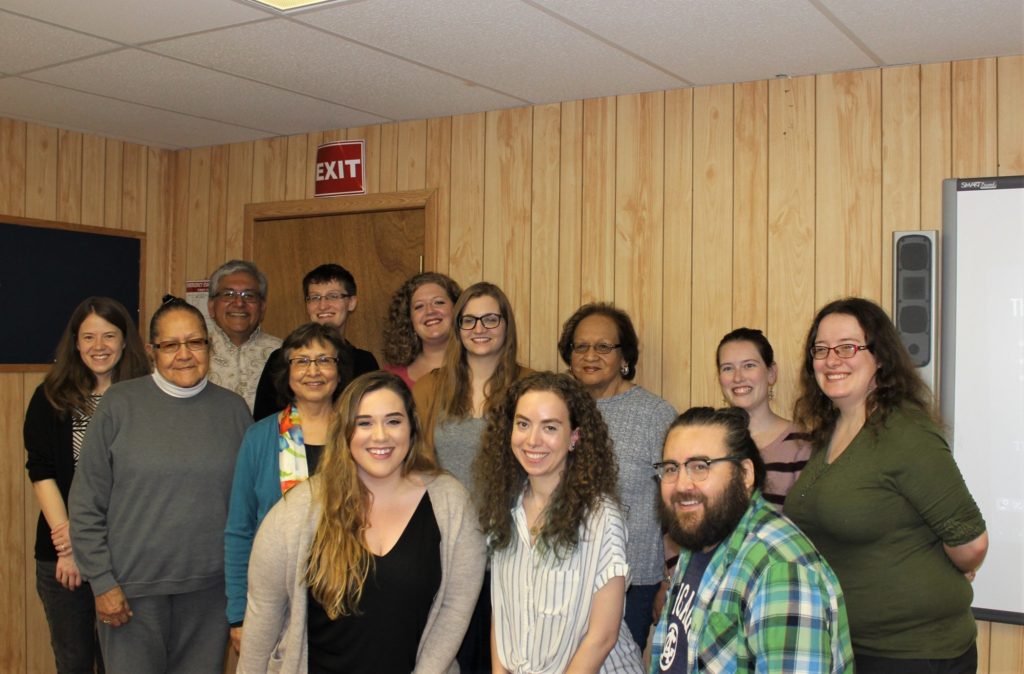 One of the communities we have worked the closest with is the Hoocąk Waaziija Haci Language Division (HLD) in Mauston. Each year of the grant, the Midwest Hub has supported the iSchool’s Tribal Libraries, Archives, and Museums (TLAM) class on their service learning projects that involve communities working with Mukurtu. In 2017, the TLAM class had the opportunity to work on the HLD Archiving Project. The project focused on compiling and preserving a large number of language materials developed to assist with revitalizing and preserving the Ho-Chunk language, including everything from recorded language lessons and elder interviews to historical texts on the people and lifeways of the past and present.
One of the communities we have worked the closest with is the Hoocąk Waaziija Haci Language Division (HLD) in Mauston. Each year of the grant, the Midwest Hub has supported the iSchool’s Tribal Libraries, Archives, and Museums (TLAM) class on their service learning projects that involve communities working with Mukurtu. In 2017, the TLAM class had the opportunity to work on the HLD Archiving Project. The project focused on compiling and preserving a large number of language materials developed to assist with revitalizing and preserving the Ho-Chunk language, including everything from recorded language lessons and elder interviews to historical texts on the people and lifeways of the past and present.
The students worked closely with the HLD to create better access to these materials for Ho-Chunk community members. They developed a cataloging system and metadata fields for Mukurtu that reflected the content that the Language Division had and they cataloged numerous videos and paper documents. Andrea Cudworth, who holds a Ph.D. in Language Sciences and was a 2017 TLAM student, continued to work on the project for the next year building the HLD’s Mukurtu instance. She worked with the 2019 TLAM class to further expand the site. To show their appreciation, the HLD hosted the students for a thank-you dinner at the end of the 2019 spring semester.
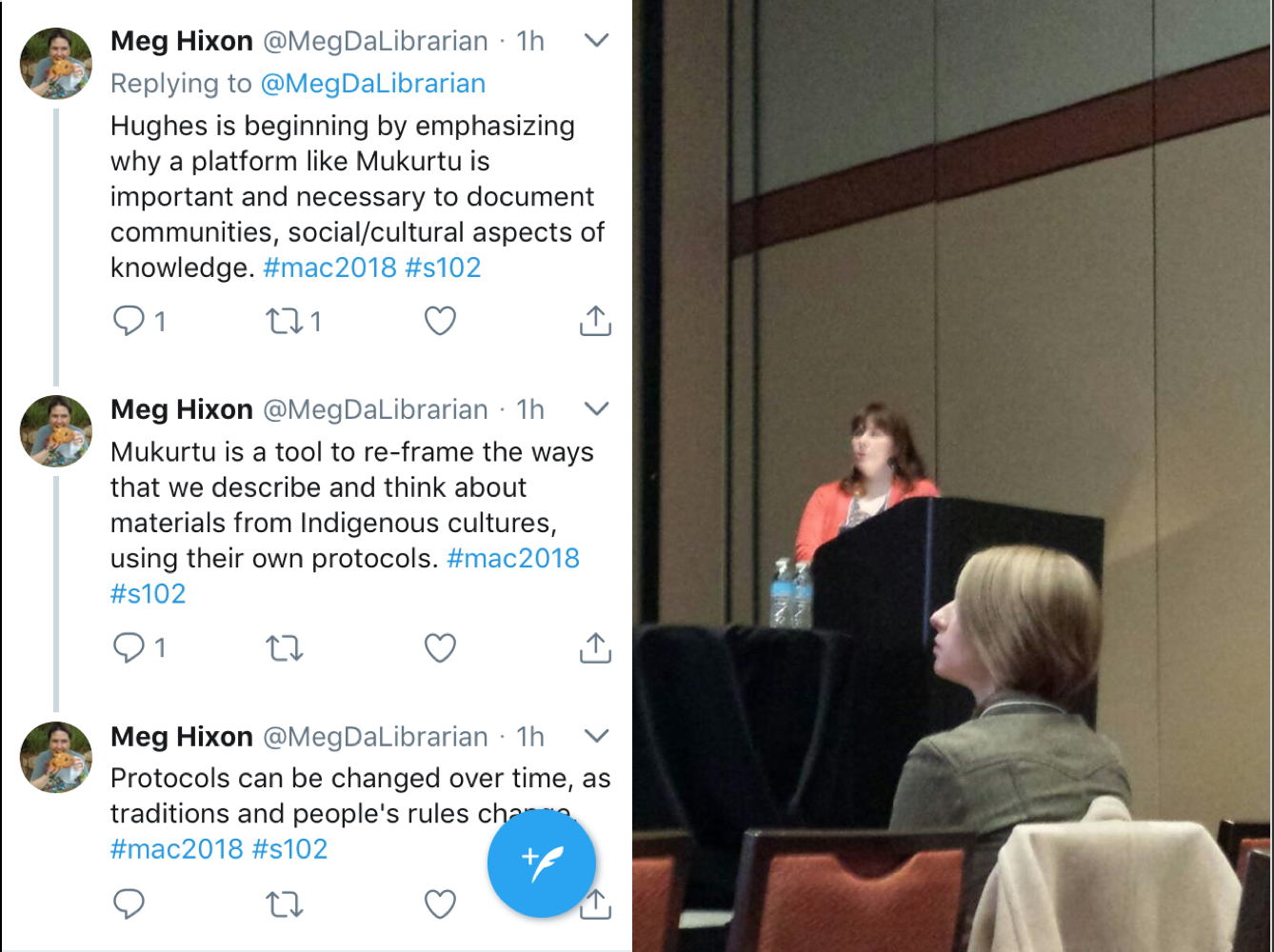 In addition to working on community projects, we wanted to educate information professionals working in libraries, archives, and museums on Digital Data Sovereignty and other Indigenous Information issues. We spent time talking about these important issues with the Intro to Archives class at the University of Wisconsin-Madison iSchool and Intro to Anthropology class at the Indiana University-Purdue University Indianapolis. We spoke at the Midwest Archives Conference in 2018, WiLSWorld 2018, and gave a WiLSWorld Short webinar with Andrea in 2019.
In addition to working on community projects, we wanted to educate information professionals working in libraries, archives, and museums on Digital Data Sovereignty and other Indigenous Information issues. We spent time talking about these important issues with the Intro to Archives class at the University of Wisconsin-Madison iSchool and Intro to Anthropology class at the Indiana University-Purdue University Indianapolis. We spoke at the Midwest Archives Conference in 2018, WiLSWorld 2018, and gave a WiLSWorld Short webinar with Andrea in 2019.
This project has been incredibly impactful for the communities and institutions we have been working with, and for me. Many of the conversations have challenged a lot of the ‘best practices’ that I have learned at school and through my career. I’m incredibly excited to keep working on this project and to continue to have conversations that work to tackle the challenge of how to define access to digital collections by using collaboration and cultural sensitivity.
 Erin F.H. Hughes is Mukurtu Hub Manager at WiLS and she welcomes your feedback or questions. Contact her at or give her a call at 608-205-8732.
Erin F.H. Hughes is Mukurtu Hub Manager at WiLS and she welcomes your feedback or questions. Contact her at or give her a call at 608-205-8732.



Comments are closed.